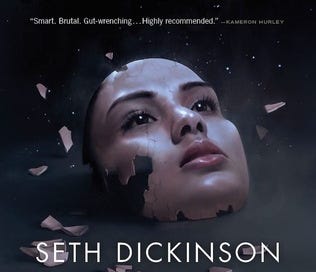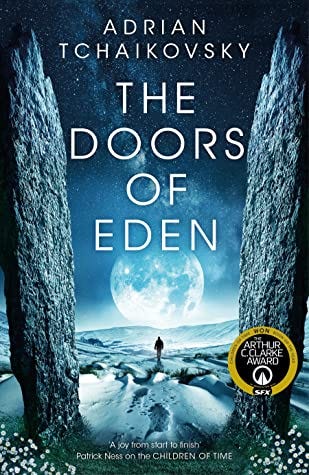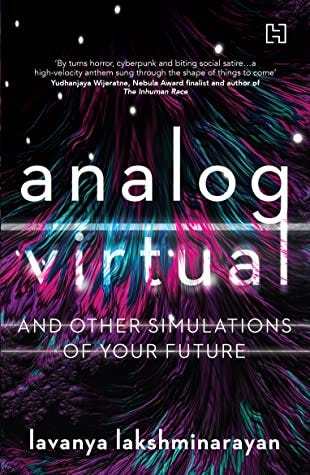Words for Worlds: Issue 4 (The Year in Review)
Hello everyone!
We’re winding down to the end of 2020, and I hope that all of you have those quiet, warm, and gentle spaces that are most suited to this time of the year.
Immersion in my sequel’s edits has meant that there’s been very little time for tackling a new read. I am breezing through Terry Pratchett’s Hogfather, because it’s Christmas soon, and marvelling both at his genius and at my own delay in getting to him (this is my second Pratchett, after Night Watch, and I foresee a binge in the near future).
But then, luckily for me, given that it is the end of the year, I can use the excuse to do a year-in-review newsletter instead of the usual format. I was fortunate enough to read some truly remarkable SFF in 2020, and I hope this review will help introduce some of these works to new readers.
Forgive the outmoded sub-genre distinctions, they’re just to help me in my own head! And you can find Goodreads links to all the books on my Goodreads Page.
Fantasy
In epic fantasy, Tor’s May give-away finally got me to read Seth Dickinson’s Baru Cormorant series, and phew! The Traitor Baru Cormorant goes right to the very top tier of my all-time list. I’ve already raved about it in the inaugural issue of this newsletter (themes of colonialism, imperialism, political economy, neuro-divergence, and the best damn slow-burn romance I’ve read). I devoured the sequel - The Monster Baru Cormorant - immediately after, and read Book 3 - The Tyrant Baru Cormorant in August, when it came out. Books 2 and 3 didn’t always hit the heights of Book 1 (honestly, Book 1 spoilt me massively, and it feels almost unfair to expect any author to hit its near-flawless composition repeatedly!); that said, I’m eagerly awaiting the concluding instalment, and Book 3’s brilliant ending has me convinced that when Dickinson completes the quartet, it is likely to be my favourite epic fantasy series.
Sticking with the genre, I read the latest Guy Gavriel Kay, A Brightness Long Ago. Kay was a writer I utterly adored in my late teens and early twenties (his influence is scattered throughout my own writing). Although I don’t read much in that style anymore, I think he remains the gold-standard when it comes to the “inspired by X period/place fantasy” sub-genre: you can see the amount of painstaking research that goes into each of his books. Speaking of the inspired-by sub-genre, Rebecca Roanhorse’s Black Sun was another solid fantasy read, set in pre-Columbian America; I also read Fonda Lee’s Jade City, a thrill-a-minute, get-your-blood-racing fantasy novel centred around the political economy of jade, and Silvia Moreno-Garcia’s Gods of Jade and Shadow, an enjoyable and satisfying novel set in Mexico.
One of my favourite science fiction writers, Yoon Ha Lee, also turned to fantasy this year with Phoenix Extravagant, a novel inspired by the Japanese/Korean war, and heavily featuring art and painting. I enjoyed the novel, and have a review of it forthcoming in Strange Horizons. Sticking with the theme of what I call social fantasy, I enjoyed Berit Ellingsen’s A Tale of Truths, an unusual novel re-playing the debate around the heliocentric model of the solar system (I interviewed Berit about the novel here). R.B. Lemberg’s The Four Profound Weaves was also a delightful social-fantasy read, in novella form. Lastly, Zelda Knight and Ekpeki Donald’s edited Dominion Anthology is a solid collection of contemporary African speculative fiction writing: to those acquainted with the genre, there will be familiar names and the comfort of being in safe hands. To those new, it serves as an excellent introduction.
Science Fiction
In science fiction, I finally got around to Ursula Le Guin’s The Word for World is Forest, and of course, as with all ULG, I have nothing to say other than everyone should read this. Sticking with the classics, I also got around to reading more Iain M. Banks, with Consider Phlebas (not quite a fan) and Use of Weapons (much better). I’m still thinking with and against The Culture, and I don’t have much to add other than it is a spectacular creation that fans of the genre should definitely read.
I read Nancy Kress’ Sea Change, an interesting piece of short cli-fi, and have a review of it coming out in Strange Horizons early next year. On the theme of reviews, Yoss - the Cuban punk rocker, bio-chemist, and science fiction writer - had his old novel, Red Dust, translated into English recently, and it is delightful (I reviewed it here ). Annalee Newitz’s The Future of Another Timeline was a fascinating exploration into an alternative history centred around the right to abortion, and Kate Elliott’s Unconquerable Sun - a gender-swapped re-telling of Alexander the Great’s campaigns in space - was finished in two 3AM sittings. Ken Liu’s collection of short stories, The Hidden Girl, demonstrated why he is a contemporary master of the genre. And near the end of the year, I read the stand-out debut, Nophek Gloss, a coming-of-age hard SF story set in a brilliant and beautifully chaotic multiverse.
My stand-out science fiction read of 2020 - and perhaps the best book I’ve read this year - is Adrian Tchaikovsky’s The Doors of Eden, a stunning novel in every respect, with an arc as long as the universe (literally), and sensitive and empathetic portrayal of human relationships.
Fantasy? Science Fiction? Who Cares!
And then there were the books that defy classification. Susanna Clarke’s Piranesi has polarised opinion. I loved it in parts, and parts were - just not for me. Ibtisam Azem’s haunting The Book of Disappearance imagines an Israel in which Palestinians physically vanish one day (I interviewed the author here) - spec fic for sure, but hard to categorise. And then there was Gideon the Ninth, and honestly, where do I start, and what do I say about this novel that hasn’t already been said? I loved it to bits - another one that went storming into that all-time top-tier - and I recommend it enthusiastically. The sequel, unfortunately, wasn’t quite for me.
India
Two Indian spec-fic novels this calendar year (I’m ignoring mine, obvs! :p), that y’all probably know about already, but as we close out December, let’s talk about them one last time in 2020. Samit Basu’s Chosen Spirits is a near-future SF novel set in Delhi, “in the best of all possibly dystopias.” Lavanya Lakshminarayan’s Analog/Virtual is similarly set in a near-future Bengaluru, a set of vignettes set in a city divided into its “virtual” and “analog” halves. Both are very good reads, and recommended.
Odds and Ends
Technically, I did read an ARC of Arkady Martine’s A Desolation Called Peace, but as I have to write up a review of it, I’ll keep shut for now. There are also two half-read books I’m carrying over into 2021 - for no other reason that my own immersion into edits has prevented me from giving them the attention they deserve. I hope to finish Aliette de Bodard’s Seven of Infinities and Gareth Powell’s Embers of War in early 2021, apart from getting to S.B. Divya’s Machinehood, Yudhanjaya Wijeratne’s Salvage Crew, and - when it comes out - Usman T. Malik’s Midnight Doorways.







